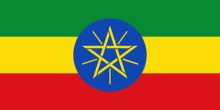Report: Ethiopia Has Criminalized Skype Calls
 Several news outlets are reporting that the Ethiopian government passed legislation criminalizing the use of voice over IP services like Skype on May 24th that has unto now gone widely unreported by the international press. The law appears to have given the Ethiopian government wide ranging control over electronic communication in the country, including the power to imprison individuals for up to 15 years for using a VoIP service.
Several news outlets are reporting that the Ethiopian government passed legislation criminalizing the use of voice over IP services like Skype on May 24th that has unto now gone widely unreported by the international press. The law appears to have given the Ethiopian government wide ranging control over electronic communication in the country, including the power to imprison individuals for up to 15 years for using a VoIP service.
The legislation is designed to prop up the country’s state-owned ISP Ethio-Telecom, whose business could take a hit by users opting not to use standard telephone service. However, the legislation conveniently mentions national security concerns, and the government is reportedly claiming the right to monitor communications and issue licenses for approved pieces of technology. This last point seems to be far more important than perceived threats to a telephony monopoly.
The new legislation reportedly calls for 15 years of imprisonment for use of an “illegal” phone service, and three to eight years in prison for making a call over the Internet. The transmission of information — specifically, voice or video — over social media also appears to have been made illegal.
In addition to all this, Reporters Without Borders issued a report last week indicating that the Ethiopian government had successfully blocked the Tor anonymous browsing system. In their report, they assert that the government has likely installed a system capable of Deep Packet Inspection in order to block the service. It’s possible that this technology may be expanded to eventually enforce the country’s ban on voice communication over the Internet.
Reporters without borders goes on to say that the control of information in Ethiopia is being extended into the print world as well. Printing operations run by the state, some of which have a monopolistic hold over the market, are demanding the right to censor anything they find objectionable. From their report:
“This contract could drag Ethiopia back more than two decades as regards media freedom, to the time of Mengistu’s brutal dictatorship in pre 1991 Ethiopia,” Reporters Without Borders said. “Allowing printers to control editorial content is tantamount to give them court powers. On what basis do these state-owned companies assume the right and independence to interpret the law? Does this reflect a government desire to suppress all criticism before it is voiced?
This level of information control is, unfortunately, not surprising. In the past year, we’ve seen electronic information suppression — and large scale Internet outages — to put down riots and protests. This legislation from Ethiopia seems to fit squarely within that vein.
(TechCrunch, Reporters Without Borders, image of the Ethiopian flag via Wikipedia)
- Iran has also cracked down on foreign email use
- U.K. blocks The Pirate Bay
- Avoid hefty fines with Hapi Berth Dey
Have a tip we should know? [email protected]